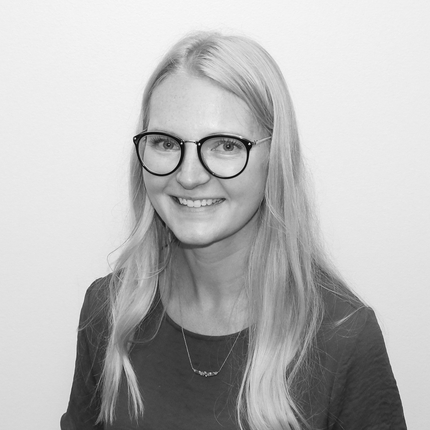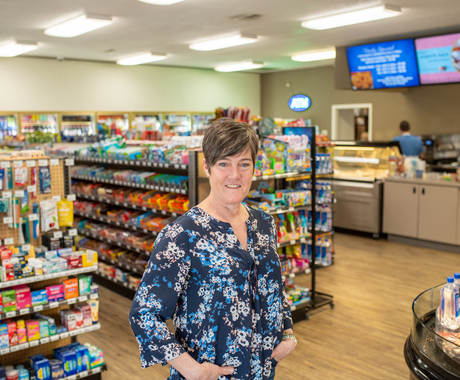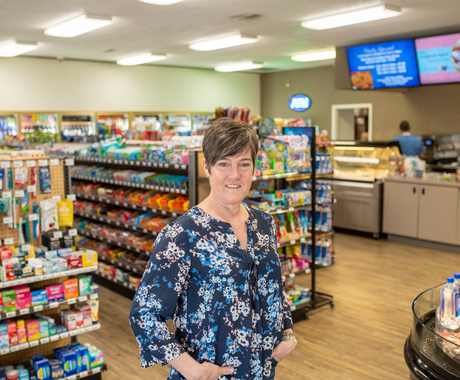The feeling didn’t happen overnight. In fact, my appreciation for local, rural communities developed over many years. I was born and raised in a growing and thriving small town that offered a plethora of amenities and opportunities. I assumed this was how everyone lived, and therefore, took it for granted. It would take some distance and time away for me to realize what a gift it is to be invested in a local place.
Growing up in the rural northwest Iowa town of Sioux Center, I was fortunate to learn in and benefit from a small but strong community. Everyone looked out for one another, shared a sense of mutual trust, and contributed their gifts and time to better the community. I am the daughter of a fourth-generation family business—a Ford dealership established by my great-grandfather—that began selling tractors and Model Ts in 1926. When my mother was a child, her parents moved to town to teach at the local college that would become my alma mater. Growing up with both sets of grandparents a stone’s throw away was a privilege. Through them I learned the meaning of working hard, loving deeply, giving back to my community, and finding value in putting down roots. I take pride in the leadership and investments my family has made in our community and, in turn, the investments the community has made to ensure the success of our town and those who choose to call the community home.
I grew up knowing and trusting all of my neighbors, perhaps more than they might have preferred. As youngsters, my brother and I felt comfortable enough to let ourselves in the neighbor's back door to raid their cookie jar. Neighbors were there if we got home ahead of our parents after school to find our house empty (and a little bit scary), and they provided a comforting place to wait. People in rural communities look out for each other and know we need to rely on one another.
While I don’t come from a farming family, our local economy, including my family’s business, is rooted in agriculture. There is a symbiotic relationship between business and farming. Despite living in town, I spent a number of years engaged in farm life. I milked cows, vaccinated cattle, rode shotgun in the planter and chopper during spring and autumn seasons, learned how to herd a few hundred head of cattle on horseback, and went on long trips hauling cattle across the Midwest.
After high school, I attended Dordt University as a pre-med student. However, I quickly came to understand that the medical field was not my passion. Having ruled out med school, I struggled with the elemental question of the meaning and purpose of my life. Dordt is located in my hometown of Sioux Center, and by college age I had become restless and jaded from staying in the same place. On a whim, I decided to study abroad as far away from home as possible, which landed me in New Zealand. With trepidation, I embarked on what would be the most eye-opening, transformative four months of my life. I learned about my relationship with the Earth and my responsibility to steward it. I also discovered the writings of Wendell Berry, an American essayist, poet, environmental activist, cultural critic, and farmer. His thoughts on community, local economy, and responsible stewardship challenged me to think deeply about my place and purpose in the world.
Upon returning from New Zealand, I developed a passion for environmental stewardship and working toward climate mitigation and resiliency. However, I was overwhelmed; the issues related to climate change and environmental degradation are massive and existential. I was plagued with questions. Where is one to begin? What is my unique role in all of this? Providentially, a couple of nonprofits doing grassroots climate work found me, and welcomed me into their fold.
After a few years of working with these nonprofits on grassroots change, I wanted to get involved directly at the policy level. I joined a U.S. Senate campaign in Iowa, which was eye-opening in a whole new direction. I discovered I didn’t need to travel across the ocean to make discoveries. The campaign afforded me the experience of traveling across the state, meeting with people and learning about their hopes and concerns for their communities. I was particularly struck by the number of struggling rural communities in Iowa. Growing up, I did not realize how fortunate I was to have lived in a thriving small town.
My experience with rural communities on the campaign trail and the continued influence of Wendell Berry in my thinking has guided me toward discerning what it is I should do with my life: advocate for the places I know best. Roughly summarizing Berry, you cannot care for places you do not know. Affection and, therefore, proper stewardship begin with knowledge and understanding of one’s neighbors, ecological context, and overall community.
I am grateful for the values my small town instilled in me and which I take with me today. Now, I want to work toward the sustainable development of other communities. I am excited to learn from and work with rural residents to build a resilient, sustainable, clean-energy future for all.
“We have lived our lives by the assumption that what was good for us would be good for the world. We have been wrong. We must change our lives so that it will be possible to live by the contrary assumption, that what is good for the world will be good for us. And that requires that we make the effort to know the world and learn what is good for it.”
― Wendell Berry, “The Long-Legged House”




